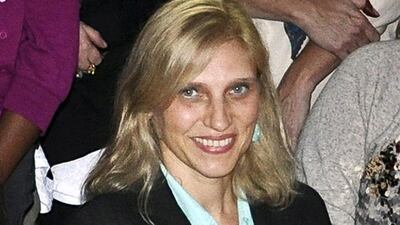It was a malevolent act seemingly designed to create public division and fear, with no regard for the private pain or misery it might cause. Yet the aftermath of the killing of Ibolya Ryan has seen exactly the opposite; sorrow and hurt at the loss of a mother, a wife, a friend, and the shared outrage of a community whose differences are as nothing when compared with how much it has in common.
When news of the murder spread, on the eve of National Day, it seemed that the act might be something much bigger, linked to the cancer of hate and bigotry that has overcome so many lands. The swift action by Abu Dhabi Police, arresting the suspect within 48 hours, and their designation of her motivation as "the result of a personal instigation and a lone terrorist act", largely laid those fears to rest.
See all our Year in Review coverage
What we remember now is that Ibolya was the mother of three children, born in Hungary, raised in Romania, with an American passport and a home in Abu Dhabi. She was a teacher, a colleague and a friend. Everyone who knew her was touched by her death.
Her former husband Paul arrived in the city from his new home in Vienna to care for their three children but also found the courage and strength to speak of what had happened. After meeting with UAE officials, he said: "I began to realise how personally they took this attack in this society and that they were deeply wounded by it, they were shocked and angered by it, that this could happen."
In Denver, Colorado, where Ibolya once lived, red balloons were released into the sky at a memorial. Pupils at several schools in Abu Dhabi also wore red in her memory. Red was her favourite colour; those images helped erase the shocking crimson stains in the bathroom of Reem Island’s Boutik Mall.
Much of what has happened in the weeks since Ibolya's killing has been about reclaiming decency from nihilism. Even the debate about the niqab, prompted by the CCTV footage of the alleged killer with her face covered, has been measured and sensitive.
A discussion in the Federal National Council produced voices both for and against restricting the niqab as a security measure. For Mona Al Bahar, from Dubai, the murder has “tainted the image of the niqab”. Ahmed Al Mansouri believed that “We have to respect all religions. Why should we stop people expressing themselves? This was a single criminal act.”
Sheikha Fatima bint Mubarak, Chairwoman of the General Women's Union, also offered her sympathy and condolences to Ibolya's children over "the horrific crime that deprived them of their mother's love at a very young age". The Government has said it will meet the costs of educating 13-year-old Timea and 11-year-old twins Adam and Aidan.
Others expressed themselves in a condolence page on The National’s website. All ages, all races, all religions, all nationalities. “We did not know you in person but you were a neighbour and a fellow human being and therefore we mourn for you and for the pain your beautiful family is going through,” wrote one.
“Ibolya was on a noble mission to teach and rear the youngsters of our nation, and raise her family in UAE society so to appreciate other people’s culture,” added another. “All that was cut short by a demented individual who stands for everything opposite to the decency of Ibolya.”
Paul Ryan responded. "Pulling together we can and will create a legacy of Ibolya's life that can extend beyond our immediate family," he wrote. "Let's use it to improve the world, help bring it together. Middle East and West. Counter precisely those influences that took her life."


